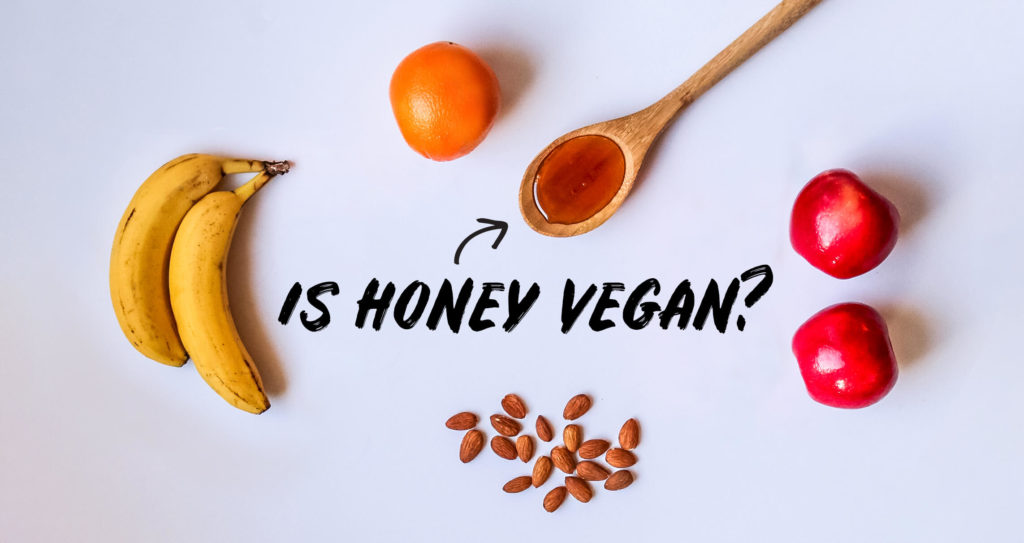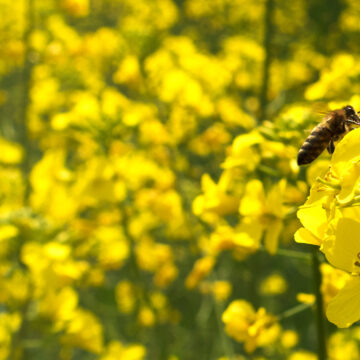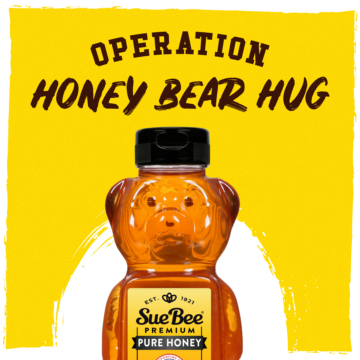Is Honey Vegan?
Hot debate swirls around the question, and it’s not a simple answer
Infants younger than 1 year old should not eat honey. That’s because their young, undeveloped bodies aren’t ready to digest it. So, aside from the first 12 months of life, most humans can enjoy the sweet, natural golden goodness of honey.
However, some people have strict diets. Fortunately, honey is gluten free. Honey is kosher, too, for those who follow the Jewish dietary regulations of the kashrut. But what about honey for those who adhere to a vegan diet? Is honey considered vegan?
Yes … and no.

Vegans avoid foods derived from animals. That means no meat, eggs and dairy. Because veganism is a way of life and not simply a diet, vegans also avoid products made from animals, such as leather shoes, wool scarfs, fur coats, etc. Nevertheless, we’re talking about diet here, and the question remains: Can vegans eat honey?
A strict vegan will say no. Honey comes from an animal. End of story. But, as ESPN’s Lee Corso famously says, “Not so fast, my friend.”
That’s because some vegans say it’s OK to eat honey. They say honey comes from flower nectar, and honeybees are simply carriers who turn the nectar into honey and release it.
On the other side, strict vegans say that honey exploits the labor of bees and that eating the honeybees’ energy source is immoral.
But wait, if you can’t eat honey because it depends on the labor of a bee then you also can’t eat any other foods that depend on the labor of a honeybee, right?
If that were the case, the non-honey-eating vegans would have to skip the blueberry-almond-milk smoothies and avocado toast, too.
The honey-eating vegans point out that farmers employ honeybees for vital pollination services for foods like almonds, avocados, blueberries, watermelons, apples, lettuce, oranges and so on. The farmers hire beekeepers to bring their honeybees to their fields to provide those crucial pollination services.
The honey-eating vegans believe that honey is just a byproduct of the pollination of these plants and crops, and, therefore, honey should be acceptable to eat.
Our take
At Sioux Honey, we want as many people as possible to enjoy our wonderful honey, which is collected by our co-op member beekeepers across the United States. We can only speak for our Sioux Honey beekeepers, but we know that our co-op members go above and beyond to protect their beloved honeybees. They do their best to shield their honeybees from predators like varroa mites and small hive beetles, and they make sure they have plenty of good, quality land on which to forage.
Furthermore, our co-op beekeepers who provide their honeybees to farmers for vital pollination services care first and foremost about their bees. Before taking their bees to places like California for the almond pollination season, they take them to warmer southern climates so they can continue to forage in the fall season, build up strength and store honey for the trip to sunny California in late-February.
We know that without the pollination services of hard-working honeybees, the world’s food supply would be greatly affected. In the U.S., we can thank honeybees for about one-third of the food we eat. That’s because the commercial production of more than 90 crops rely on honeybee pollination. In the U.S. alone, honeybees pollinate an estimated $15 billion in added crop value.
And by the way, we haven’t even mentioned other products derived from honeybees and their hives, like wax for candles, lip balm, cosmetics, artists’ materials, wood polishes, and waterproofing. Beeswax is also used as binding agents, time-release mechanisms and drug carriers for pharmaceuticals. The list goes on and on.
The point is, our Sioux Honey Co-op beekeepers love their honeybees. They take care of them and make sure they live healthy and strong lives. And if we are able to enjoy the honey produced as a result of all the pollinating and nectar collecting honeybees do, then we are happy to share that honey with everyone in the world.



